Blut und Schlacht (Blood and Battle): A Learner’s Saga
- Thread starter Bullfilter
- Start date
-
We have updated our Community Code of Conduct. Please read through the new rules for the forum that are an integral part of Paradox Interactive’s User Agreement.
You are using an out of date browser. It may not display this or other websites correctly.
You should upgrade or use an alternative browser.
You should upgrade or use an alternative browser.
Threadmarks
View all 262 threadmarks
Reader mode
Reader mode
Recent threadmarks
Chapter 159: The Valkyries’ Friend Three: Die Hard with a Vengeance (March 1021 to June 1024) Chapter 160: How do you solve a problem like Hafrid? (June 1024 to July 1026) Chapter 161: Faith, Gold and Ambition (August 1026 to June 1029) Chapter 162: War, Gold and Conquest (July 1029 – December 1031) Chapter 163: Helgi Rurikid and the Chamber of Secrets (December 1031 – October 1032) Chapter 164: Tyrs for Fears (October 1032 - September 1035) Chapter 165: A Lesson in Diplomacy (September 1035 – June 1039) Chapter 166: A Sliding Door (July 1039 – November 1041)Ah yes, that can turn out to be a problem if you find a devoted pagan. Well, sooner or later it was going to happen.Ch 14 Learning Point 1: Devout Warriors. Well, as I was playing on from here and wanted to quickly find out what the hell had happened here, I did a quick search and found this info in a dev diary and a thread comment: “First of all, Defensive Pagans now have the ability to summon bands of Devout Warriors if they are the primary defender against an enemy of a different religion at the cost of 200 piety. Overall this is rather like the Raise Tribal Army decision and gives Defensive Pagans some extra punch when attacked.” Looks like it’s 2,000 troops per 200 Piety, in a defensive war. And you can see Dobrozhir, who started with 227 Piety, now has 26, plus 2,000 event spawned troops. I’m glad he didn’t have 400+ piety!!
If I am not wrong, but I admit I'm not sure this time around, your fleet is safe until the enemy raids the city. I could be wrong and it could be safe even then, but I don't want to say it like I'm sure. Honestly CK2 has so little interactions about ships that I tend to forget about them completely. In your situation however I dare say that the problem is that you have to pay the ships, so if I was you I would leave them in the port.Ch 14 Q1: Fleets at Port. Is that right? If a fleet is in port when a province is taken, is it captured or destroyed? Or does it automatically escape to sea?
Yes, if the raiding toggle is on you would have found yourself raiding the province. Not only that, but you wouldn't even be able to change it back once you are outside of your own land, you would have to return to your closest county. Basically the opposite of what happened to you last time.Ch 14 Q2: Looter Toggle (again). Another minor learning point: when I couldn’t get the forces to merge at first, I discovered the looting toggle was still on with Rurik’s Raiders, and it was apparently preventing the merger. I switched it off and that allowed them to merge as usual. That raiding toggle is no end of arcane trouble for a CK2 neophyte! So, I also assume had I proceeded to move that force into Pskov, it would have been treated as a raiding instead of an invading force – until such time as I discovered and changed it?
It's because of the Mercenary troop, they start with very low morale and they gain it over time, much like vassals. The reason why you personally were at about 50% is that your troops included some that you had raised at the beginning of the war and that therefore had gained morale while marching against your opponent, while your other commanders only had newly raised merc. Morale is I dare say one of the main points of the battle, so always make sure that it's at one hundred percent or very close to it when you are facing an enemy that is equal or stronger to you.Ch 14 Q3: Morale. OK, it was only later that I noticed a few things I didn’t at the time. The first is this issue of morale. Before they set out (after they were called up) this new army seemed to have a full green bar of morale (on the main map icon, anyway). Yet now, as I look back on the screenshot, I see the morale of Helgi’s and Sverker’s wings are suddenly near zero, and of Rurik’s only about 50%. I wonder what has caused this? Is it specific to the commander and residual from the battle just fought – and lost? But then, given Helgi has only just been assigned, that should not apply to him. If it is to the troops, why is it suddenly so low? Is there some ramping-up period for the mercs to come to full morale that I didn’t notice at the time? Or something about changing commanders on them (which again I hadn’t noticed before)? Any knowledge or pointers on this aspect, or what the causes of this lowered morale might have been, very welcome.
So, I will analyze the battles to try and see what went wrong.Ch 14 Q4: Field Battles. Bearing in mind the rest of this campaign has been fought out but still seeking to learn as much from this opening six months few months as possible, I’ll pose a few other questions (to add to those mentioned above in the commentary and in Rurik’s reflections. Are there other factors here I’ve ignored or should have looked at more closely? Should I next time record some of the ‘mouse-over’ battle stats that come up for any pointers about what has gone on – or is that really just pre-ordained and there for flavour? Any pertinent tips or tactics welcome.
First Battle of Ingria Tribe:
Now, the battle was on a plain ground, with no boosts for neither attackers or defenders. As you can see, the enemy has a very strong right flank, while you have an equally distributed force, with a main centre. This is usually good, but since your enemy has such a gigantic flank compared to yours, it means you would have needed the flank that was opposing it to manage to resist until the end of the fight. You may notice that your commander was losing far more men then is opponent, and this, united with his numerical disadvantage, led to a failure in stalling. You have to remember that depending on the commanders traits, they also may be more useful on a flank or in the centre. In this case I dare say his flank commander was probably good for his position, while your probably was relaying only on his martial skill.
Bottom line, when the enemy centre block you found yourself with a strong enemy on the most dangerous side, with no defence on that front because it had already been routed. Since the AI didn't lose time in attacking the destroyed flank, focusing instead on attacking your now weakened centre, you found yourself overwelmed and ultimately defeated.
The best course of action in this case was probably to order a retreat as soon as your flank fell, or even better close before that. You can do that by selecting the army and moving it to another location. After moving to a safer place, maybe on the other side of the river, I would have reorganized my army to either be able to face his flank or with a stronger center. It would still be a defeat, and I think you would have lost a few more men, but you would have saved time and your army was going to be closer, ready to join with the merc.
I guess you were also a bit unlucky, had you managed to push through a bit sooner you would have won, what I am saying above comes from my past experience with very strong flanks in equally strong armies, maybe others can give you some advise that doesn't involve retreat, but personally that's what I would have done when realizing my flank was outmatched.
Second Battle of Ingria Tribe:
Now here your biggest mistake was crossing the river. That is something you don't want to do even with a bigger army, let alone when you are equally matched. Crossing the river gave you a malus (that you can see both before the battle, near the crossed swords, and during the battle, although there is too late). This gave a boost to the defenders (which are the guys waiting for you on the other side of the river) and meant you were starting already with a disadvantage. After that however another, totally different problem, was that your son pursued the defeated flank instead of heading to the other, stronger flank, while you, the center, moved against it. This has to do mostly with the character traits, and honestly there is little to do about.
If I were you, in this case, first I would have crossed the river in another point, to be evenly matched instead of at disadvantage. Second thing, I would have either waited for the defeated force (yes, it's a painful wait, but it was necessary in my opinion). If instead I needed to charge against my enemy, it would have been wiser to rearrange the troops to match the stronger flank, or by making the center itself stronger. You already found out a long time ago how to do that.
Keep in mind, when the forces are evenly matched, something can always go wrong, I think this second battle is the best proof of it. The suggestions above are only to try and make your chances of success higher.
BUT, I also want to give you another kind of suggestion, the "How do I win a war against a fairly strong enemy that only has one province" method:
You don't have to fight him at all. Let him try and seize Ingria, while he is at it, you can easily attack his county. Once you have conquered the whole province, the war is over and you have won without any battle. This can really turn out useful, if the enemy goes for the offensive first like the Chief did. You could have easily taken your men, sieged his tribal holdings while he was away, and won.
Damn this was a reverse! Time to learn the lessons o’king, gather the forces onc3 more and go again. Can’t really add anything tactically to what @Rufy_King has said as it’s all great advice
What @Rufy_King said. I'll echo the suggestion to let him at one of your undefended provinces while you siege down his holding. A tactical draw (1 for 1 provinces occupied) but a strategic victory wherein he holds one of your 6 provinces while you control all of his lands. The best victory is a bloodless one.
Yeah, defensive pagans are a pain. Live and learn; your levies will recover!
Basics of attack: High morale, at least a slight numerical advantage, never attack into mountains, across a river/channel, and unload your armies from your boats where their armies are not at.
You can ignore all of those with a massive numerical advantage (doomstack). But you aren't there yet
500 prestige yet? It may be time for the Norse Tribal Army snowball war for Rus!
Edit: I may as well define that. A Tribal Army as you noticed, gives you 2500 men for 500 prestige. They disappear the day after a truce, assuming that you are then fully at peace. So if you use one to kick the snot out of a one-county loser, pause the game when he surrenders (before clicking on the surrender message), accept the surrender, and declare war against some other weakling before 1 day has passed, the Tribal Army does not disband because you are still at war and the disband condition trigger (At Peace) isn't met.
This, in conjunction with the "Become King of Rus" ambition, which gives you unlimited use of the "Subjugation" CB within the de jure Kingdom of Rus, let' you conquer the Kingdom in just a few years. With each war you win, you earn prestige, netting more Tribal Armies, until you run out of targets. Then I usually declare Tributary wars until my borders are secure and go raiding to build up my suddenly massive desmesne.
It's kind of gamey, but it's loads of fun.
Further edit: I learned the power of this tactic from the excellent opening character of the "Many AAR One" AAR on these forums. I really enjoyed that AAR, the first couple of pages really showcased the power of Tribal Armies. I'm sure there are better examples out there for beginners to learn from, but the guy went from a single county in Norway to passing out 3 or 4 Kingdom titles to his kids when he died via gavelkind, IIRC. Really fantastic AAR start to finish.
Yeah, defensive pagans are a pain. Live and learn; your levies will recover!
Basics of attack: High morale, at least a slight numerical advantage, never attack into mountains, across a river/channel, and unload your armies from your boats where their armies are not at.
You can ignore all of those with a massive numerical advantage (doomstack). But you aren't there yet
500 prestige yet? It may be time for the Norse Tribal Army snowball war for Rus!
Edit: I may as well define that. A Tribal Army as you noticed, gives you 2500 men for 500 prestige. They disappear the day after a truce, assuming that you are then fully at peace. So if you use one to kick the snot out of a one-county loser, pause the game when he surrenders (before clicking on the surrender message), accept the surrender, and declare war against some other weakling before 1 day has passed, the Tribal Army does not disband because you are still at war and the disband condition trigger (At Peace) isn't met.
This, in conjunction with the "Become King of Rus" ambition, which gives you unlimited use of the "Subjugation" CB within the de jure Kingdom of Rus, let' you conquer the Kingdom in just a few years. With each war you win, you earn prestige, netting more Tribal Armies, until you run out of targets. Then I usually declare Tributary wars until my borders are secure and go raiding to build up my suddenly massive desmesne.
It's kind of gamey, but it's loads of fun.
Further edit: I learned the power of this tactic from the excellent opening character of the "Many AAR One" AAR on these forums. I really enjoyed that AAR, the first couple of pages really showcased the power of Tribal Armies. I'm sure there are better examples out there for beginners to learn from, but the guy went from a single county in Norway to passing out 3 or 4 Kingdom titles to his kids when he died via gavelkind, IIRC. Really fantastic AAR start to finish.
Last edited:
Ch 14 Learning Point 1: Devout Warriors. Well, as I was playing on from here and wanted to quickly find out what the hell had happened here, I did a quick search and found this info in a dev diary and a thread comment: “First of all, Defensive Pagans now have the ability to summon bands of Devout Warriors if they are the primary defender against an enemy of a different religion at the cost of 200 piety. Overall this is rather like the Raise Tribal Army decision and gives Defensive Pagans some extra punch when attacked.” Looks like it’s 2,000 troops per 200 Piety, in a defensive war. And you can see Dobrozhir, who started with 227 Piety, now has 26, plus 2,000 event spawned troops. I’m glad he didn’t have 400+ piety!!
Yep, defensive pagans can raise 2000 soldiers for 200 piety when fighting a defensive war against an enemy of a different faith. The defensive pagan religions are Romuva, Slavic, Suomenusko and West African (as opposed to the offensive pagan religions Germanic, Tengri and Aztec). Anyone who isn't an unreformed non-Germanic pagan instead has the opportunity to hire holy orders for a large amount of piety (Germanic nations can form a Germanic holy order in 920), which work like mercenaries except you don't have to pay them. Especially Catholic nations can be difficult to invade late game as they have access to several holy orders.
Defensive pagans can raise devout warriors several times, so if they e.g. had 1000 piety they could immediately raise 10000 soldiers. You should therefore always look at the piety level of Romuva/Slavic/Suomenusku/West African countries before invading them. You should naturally also look at their prestige level as they can raise 2500 soldiers for 500 prestige just like Germanic countries can.
Thanks slippyduck and welcome on boardYep, defensive pagans can raise 2000 soldiers for 200 piety when fighting a defensive war against an enemy of a different faith. The defensive pagan religions are Romuva, Slavic, Suomenusko and West African (as opposed to the offensive pagan religions Germanic, Tengri and Aztec). Anyone who isn't an unreformed non-Germanic pagan instead has the opportunity to hire holy orders for a large amount of piety (Germanic nations can form a Germanic holy order in 920), which work like mercenaries except you don't have to pay them. Especially Catholic nations can be difficult to invade late game as they have access to several holy orders.
Defensive pagans can raise devout warriors several times, so if they e.g. had 1000 piety they could immediately raise 10000 soldiers. You should therefore always look at the piety level of Romuva/Slavic/Suomenusku/West African countries before invading them. You should naturally also look at their prestige level as they can raise 2500 soldiers for 500 prestige just like Germanic countries can.
Ch 14 Q1: Fleets at Port. Is that right? If a fleet is in port when a province is taken, is it captured or destroyed? Or does it automatically escape to sea?
Escape to sea.
Ch 14 Q3: Morale. OK, it was only later that I noticed a few things I didn’t at the time. The first is this issue of morale. Before they set out (after they were called up) this new army seemed to have a full green bar of morale (on the main map icon, anyway). Yet now, as I look back on the screenshot, I see the morale of Helgi’s and Sverker’s wings are suddenly near zero, and of Rurik’s only about 50%. I wonder what has caused this? Is it specific to the commander and residual from the battle just fought – and lost? But then, given Helgi has only just been assigned, that should not apply to him. If it is to the troops, why is it suddenly so low? Is there some ramping-up period for the mercs to come to full morale that I didn’t notice at the time? Or something about changing commanders on them (which again I hadn’t noticed before)? Any knowledge or pointers on this aspect, or what the causes of this lowered morale might have been, very welcome.
Mercs are indeed raised at low morale, and need time after hiring to get organized/whatever.
Ch 14 Q4: Field Battles. Bearing in mind the rest of this campaign has been fought out but still seeking to learn as much from this opening six months few months as possible, I’ll pose a few other questions (to add to those mentioned above in the commentary and in Rurik’s reflections. Are there other factors here I’ve ignored or should have looked at more closely? Should I next time record some of the ‘mouse-over’ battle stats that come up for any pointers about what has gone on – or is that really just pre-ordained and there for flavour? Any pertinent tips or tactics welcome.
Don't neglect the impact of morale. When it breaks, that flank goes into the "pursuit" phase which allows the victor to inflict extra casualties to the broken army (this is especially dangerous against cavalry heavy armies). Based on where the battle was fought, if you crossed the nearby river to enter battle, that is a penalty. If possible, try to approach the enemy away from rivers.
On a side note, sorry I've been away, the notifications were not showing up, and I got suspicious that your aar had continued and I was right. I look forward to further contributions during the thing.
Escape to sea.
Ch 14 Q3: Morale. OK, it was only later that I noticed a few things I didn’t at the time. The first is this issue of morale. Before they set out (after they were called up) this new army seemed to have a full green bar of morale (on the main map icon, anyway). Yet now, as I look back on the screenshot, I see the morale of Helgi’s and Sverker’s wings are suddenly near zero, and of Rurik’s only about 50%. I wonder what has caused this? Is it specific to the commander and residual from the battle just fought – and lost? But then, given Helgi has only just been assigned, that should not apply to him. If it is to the troops, why is it suddenly so low? Is there some ramping-up period for the mercs to come to full morale that I didn’t notice at the time? Or something about changing commanders on them (which again I hadn’t noticed before)? Any knowledge or pointers on this aspect, or what the causes of this lowered morale might have been, very welcome.
Mercs are indeed raised at low morale, and need time after hiring to get organized/whatever.
Ch 14 Q4: Field Battles. Bearing in mind the rest of this campaign has been fought out but still seeking to learn as much from this opening six months few months as possible, I’ll pose a few other questions (to add to those mentioned above in the commentary and in Rurik’s reflections. Are there other factors here I’ve ignored or should have looked at more closely? Should I next time record some of the ‘mouse-over’ battle stats that come up for any pointers about what has gone on – or is that really just pre-ordained and there for flavour? Any pertinent tips or tactics welcome.
Don't neglect the impact of morale. When it breaks, that flank goes into the "pursuit" phase which allows the victor to inflict extra casualties to the broken army (this is especially dangerous against cavalry heavy armies). Based on where the battle was fought, if you crossed the nearby river to enter battle, that is a penalty. If possible, try to approach the enemy away from rivers.
On a side note, sorry I've been away, the notifications were not showing up, and I got suspicious that your aar had continued and I was right. I look forward to further contributions during the thing.
Thanks for the advice and no need at all to apologise - those flags can be very capricious- I tend to rely more on my ‘watched threads’ tab now to check every so often. Thanks for checking in during the holiday seasonCh 14 Q1: Fleets at Port. Is that right? If a fleet is in port when a province is taken, is it captured or destroyed? Or does it automatically escape to sea?
Escape to sea.
Ch 14 Q3: Morale. OK, it was only later that I noticed a few things I didn’t at the time. The first is this issue of morale. Before they set out (after they were called up) this new army seemed to have a full green bar of morale (on the main map icon, anyway). Yet now, as I look back on the screenshot, I see the morale of Helgi’s and Sverker’s wings are suddenly near zero, and of Rurik’s only about 50%. I wonder what has caused this? Is it specific to the commander and residual from the battle just fought – and lost? But then, given Helgi has only just been assigned, that should not apply to him. If it is to the troops, why is it suddenly so low? Is there some ramping-up period for the mercs to come to full morale that I didn’t notice at the time? Or something about changing commanders on them (which again I hadn’t noticed before)? Any knowledge or pointers on this aspect, or what the causes of this lowered morale might have been, very welcome.
Mercs are indeed raised at low morale, and need time after hiring to get organized/whatever.
Ch 14 Q4: Field Battles. Bearing in mind the rest of this campaign has been fought out but still seeking to learn as much from this opening six months few months as possible, I’ll pose a few other questions (to add to those mentioned above in the commentary and in Rurik’s reflections. Are there other factors here I’ve ignored or should have looked at more closely? Should I next time record some of the ‘mouse-over’ battle stats that come up for any pointers about what has gone on – or is that really just pre-ordained and there for flavour? Any pertinent tips or tactics welcome.
Don't neglect the impact of morale. When it breaks, that flank goes into the "pursuit" phase which allows the victor to inflict extra casualties to the broken army (this is especially dangerous against cavalry heavy armies). Based on where the battle was fought, if you crossed the nearby river to enter battle, that is a penalty. If possible, try to approach the enemy away from rivers.
On a side note, sorry I've been away, the notifications were not showing up, and I got suspicious that your aar had continued and I was right. I look forward to further contributions during the thing.
Ah, but I really appreciate the indication of active reading - always good to know one isn’t writing to a vacuumEveryone else had provided much better answers than I could.
And (to all) any comments don’t need to be restricted to the specific gameplay questions I pose - happy for any narrative comments as well: eg views on Rurik’s morals and the dangers of taking a lover when the Queen is also the Spymaster; Helgi’s efforts to overcome his craven nature; are the Slovenskys perfidious or persecuted; will Alfgeir react badly if he discovers he’s been cuckolded; etc
I think you’re doing a great job thus far of making Rurik and his actions believable and of their day. I like the short speeches and descriptions of the unfolding history. So from me it’s a big Old thumbs up!Ah, but I really appreciate the indication of active reading - always good to know one isn’t writing to a vacuum.
And (to all) any comments don’t need to be restricted to the specific gameplay questions I pose - happy for any narrative comments as well: eg views on Rurik’s morals and the dangers of taking a lover when the Queen is also the Spymaster; Helgi’s efforts to overcome his craven nature; are the Slovenskys perfidious or persecuted; will Alfgeir react badly if he discovers he’s been cuckolded; etc
Thank you - appreciated from such an expert CK2 strorytellerI think you’re doing a great job thus far of making Rurik and his actions believable and of their day. I like the short speeches and descriptions of the unfolding history. So from me it’s a big Old thumbs up!
Thanks for the support - it’s wonderful to have it.
Hmmm...seems that everybody else has pretty much covered all the basics of not losing a battle. So not much I can add. You just have to remember numbers are only one tiny factor in the battles. Don't be scared to take a few days more to move troops around, wait for reinforcements, or even chase down smaller enemy forces to stomp them while their Big Brother is off in a siege. Remember, even the Despot lost a few battles.
Wise words - the second instalment of the current period of Blood and Battle with the Pesky Pskovans is well into production. You will see Rurik had already learned some valuable lessons - but will it be enough to beat the wily Dobrozhir and his Slavic holy warriors? All will be revealed soon!Hmmm...seems that everybody else has pretty much covered all the basics of not losing a battle. So not much I can add. You just have to remember numbers are only one tiny factor in the battles. Don't be scared to take a few days more to move troops around, wait for reinforcements, or even chase down smaller enemy forces to stomp them while their Big Brother is off in a siege. Remember, even the Despot lost a few battles.
Chapter 15: More Blood on the Axe (1 January – 18 July 873)
Chapter 15: More Blood on the Axe (1 January – 18 July 873)
Foreword – AuthAAR’s Note
As promised, here is the second instalment of the war of conquest on Pskov. So far, things have gone badly wrong. Again, I note here that this period was played through before the last set of advice was received, so I’m not ignoring any of the points the readership have made since Chapter 14
 . Though I think I had already picked up on a few things following the reverses of the preceding months!
. Though I think I had already picked up on a few things following the reverses of the preceding months!
As mentioned before, I will do a collated summary of all points/Q&As from both chapters after this one, as there may be some more overall comments made. We pick up the story with Pskov once again victorious in Ingria following a rash and over-confident attack on Ingria from Holmgarðr over the Volkhov river. The war score now stands at -34% in Pskov’s favour. And Rurik must consider Plan D!
January 873
The first news of the new year of 873 CE is bad. The Pskovan siege of Ingria’s small garrison of 112 is over; the siege of Ingria Tribe begins. The mercenary-based Holmgarðian army (the Bulgarian Company) is still retreating south from Ingria.
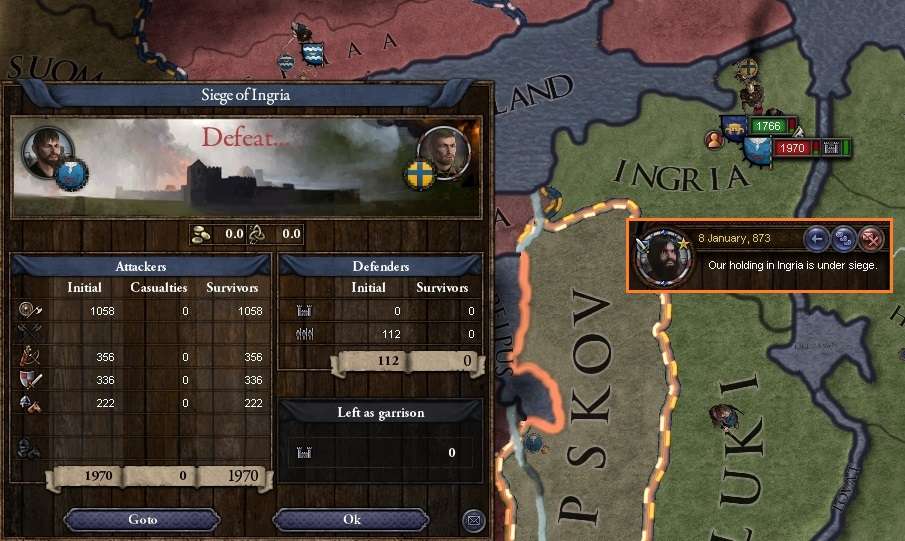
Rurik is now back in Holmgarðr, with Helgi – who is generally very angry about the defeat, taking it out on the common soldiers. As he seems to do when he feels his pride has been besmirched – and his shaky courage challenged, which he tends to try to cover with bravado. These traits undermine what should otherwise be the very strong martial abilities of a smart young man.
The scribes are immediately sent to write the letters of summons, which will soon be on their way.
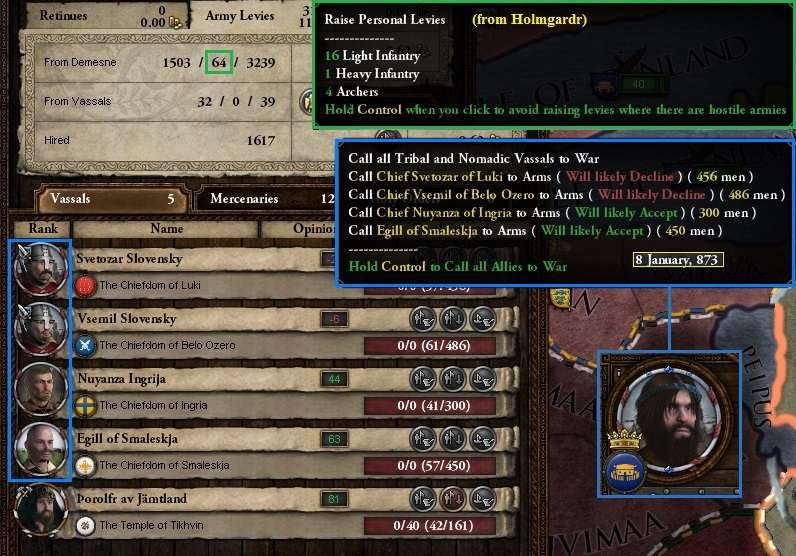
The responses start coming in a few weeks later. Neither of the Slovenskys answer the call – Rurik had thought a little better of Vsemil. But no, he would not support the fight against his kinsman, even though Pskovan troops (and holy warriors of their own Slavic persuasion too – the filthy heretics) are encamped on Holmgarðian soil. Well, let their ‘acorns’ be roasted over a slow fire – while still attached! Loyal Egill was never doubted and Nuyanza (both through improved opinion of his King and as the one whose lands are under siege) is willing – though it’s uncertain what the latter can actually do to aid the cause in his situation.
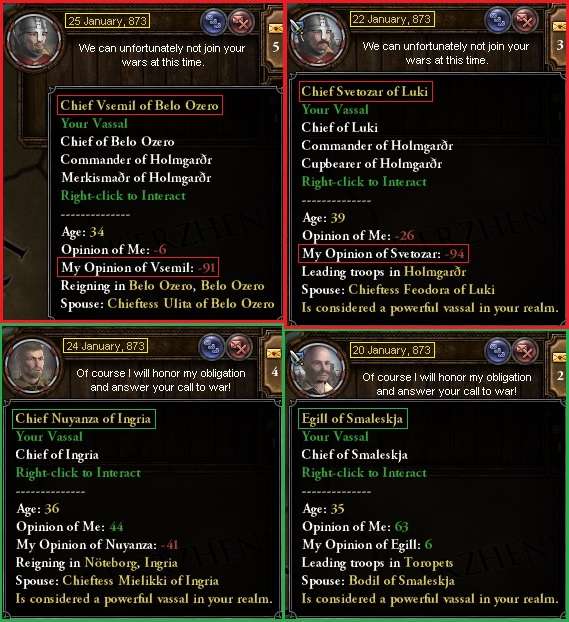
The month ends with Holmgarðr’s forces in movement around the realm. The main (original) army of the realm is in Toropets, having rallied in Smaleskja, and is on its way back to the capital. Egill’s Smaleskjan contingent of 450 men is now also on its way to the capital. The recently defeated Bulgarian Company is in Luki in retreat to its rally point in Smaleskja. The Pskovans continue the siege in Ingria.
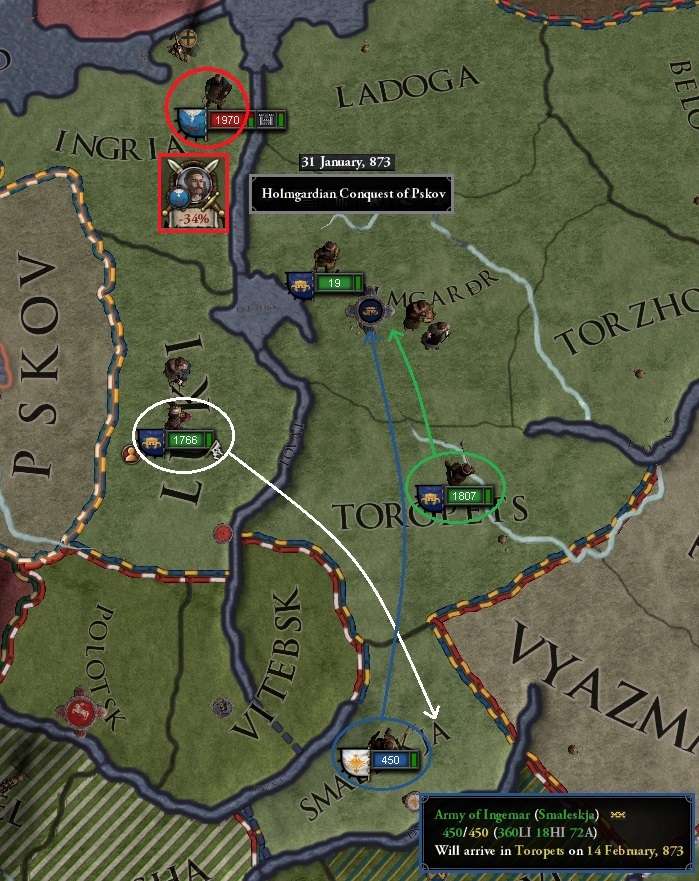
February 873
Chief Nuyanza provides a report on the progress of the siege of his last holding in Ingria. He would like to plead for its relief, but knows the King has tried this twice now, to no avail, and the full strength of the realm will take time to assemble. The job of defending his keep is left to one of his vassals. But this time it will take longer, which at least buys time for Rurik to gather his forces.
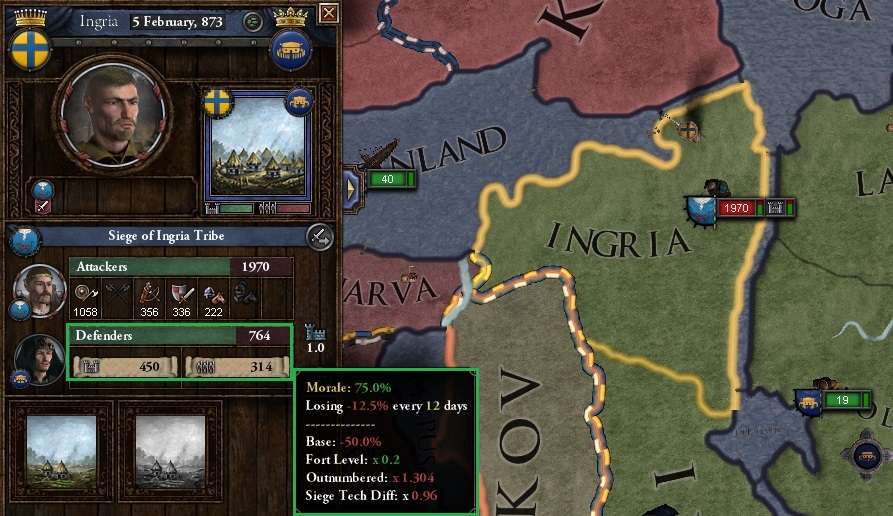
By 23 February, the kingdom’s main army is back in the capital and has merged with the few reinforcements already there. At least now Holmgarðr county itself can be credibly defended from a Pskovan raid. Sverker and Helgi are given the wing commands again – despite Rurik’s unspoken misgivings about his son.
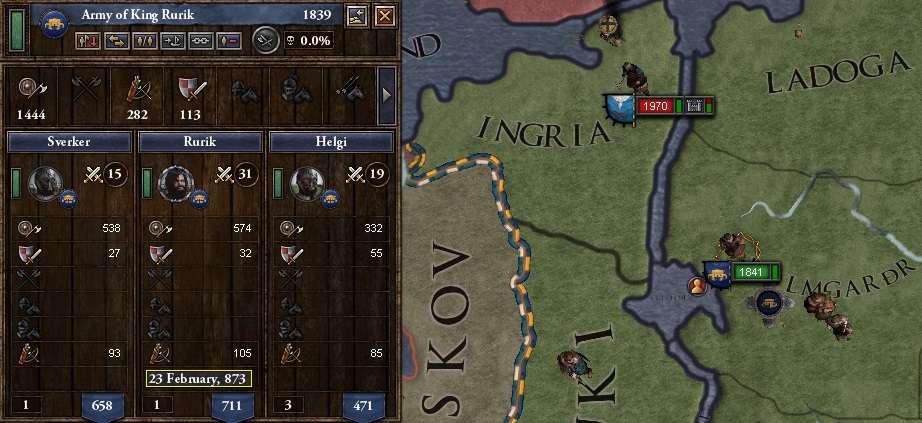
April 873
Mid-April sees the fall of the Ingria Tribe holding and the occupation of that county by Dobrozhir’s Pskovans. He sets his sights next on Luki: where his recalcitrant relative Svetozar refuses to call out his men to aid the realm. Perhaps he wants Dobrozhir to come – even if his brother himself has claim on Luki. The treasonous scum! Meanwhile, the loyal Egill’s forces have joined the King in Holmgaðr and the Bulgarian Company are not far away after their long retreat south and now march back north, through the spring thaw – and mud.
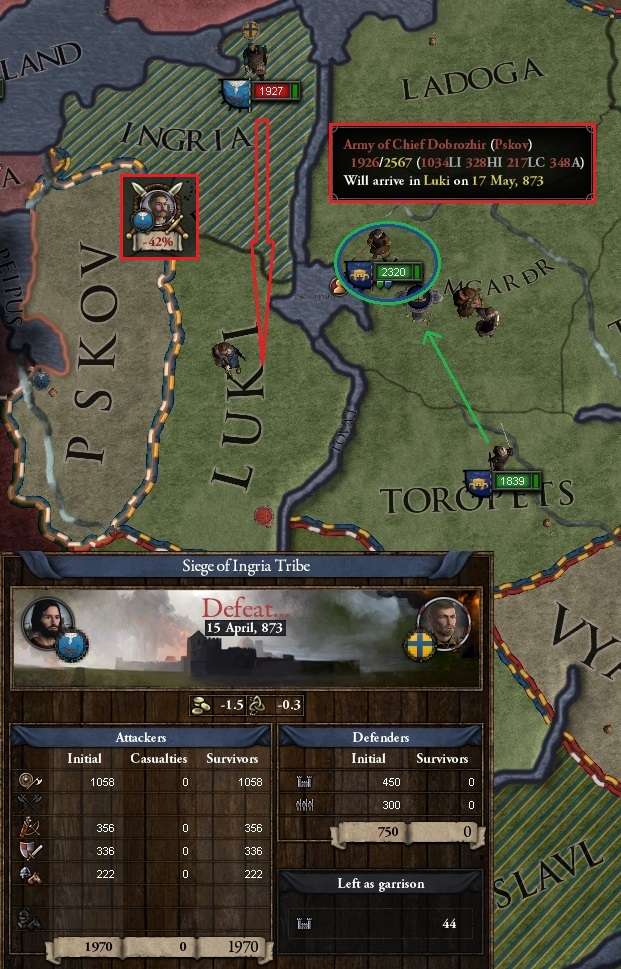
May 873
In the beginning of May, Rurik has his full strength mustered, including a decent mix of light and heavy infantry, archers and light cavalry. He decides to try to deter Dobrozhir from entering Luki (where they will be difficult to get at without exposing the capital to danger), even though it involves another possible river-crossing attack. Rurik can always pull out if the Pskovans persist, making it a feint.
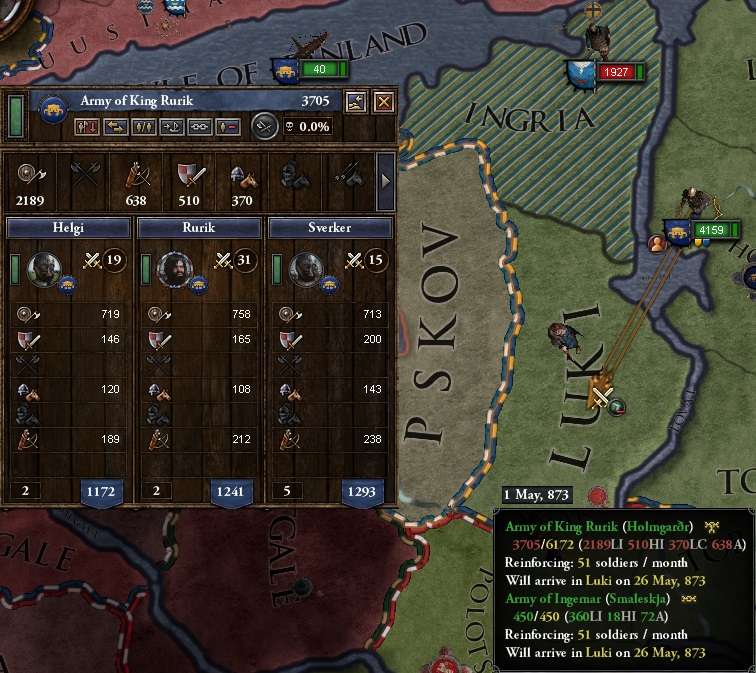
The tactic works. At the end of the week, Dobrozhir changes course and heads straight to Holmgarðr! Rurik halts too – it suits him fine if Dobrozhir wants to attack him across a river this time! He now fully appreciates, as he plans his defence, the disadvantage he placed himself under in his last attack on Ingria, as the Pskovans head his way over the same river.
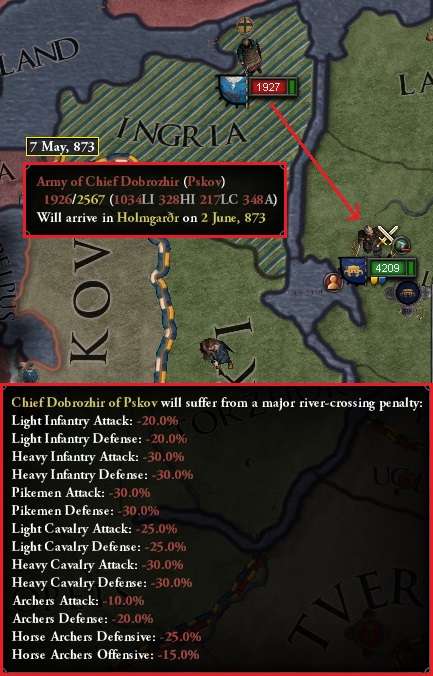
But the game of cat-and-mouse gets more and more complicated. First, on 10 May Dobrozhir sees Rurik is ready for him in Holmgarðr and strikes east instead to Ladoga. The ignominy (and danger to facilities) of having his second most important personal holding occupied for too long are prohibitive for Rurik. On 12 May he moves to block this attack: if Dobrozhir persists, Rurik will hit him a couple of days after the Pskovans arrive. Again, Dobrozhir is baulked and on 13 May he breaks off the river crossing and pulls back to Ingria, while Rurik again waits in the centrally located capital to see what his enemy does next.
Four days later, Dobrozhir seemingly loses either his patience or his nerve and heads back to Pskov. This is just the kind of thing Rurik was waiting for: he marches the same day for Luki to shadow the enemy force, and will arrive there three days after the Pskovans are due back to their homeland. And wherever they go after that, Rurik will be able to attack them without a river in the way. But best if it is in their own holding - meaning a chance to end the war quickly.
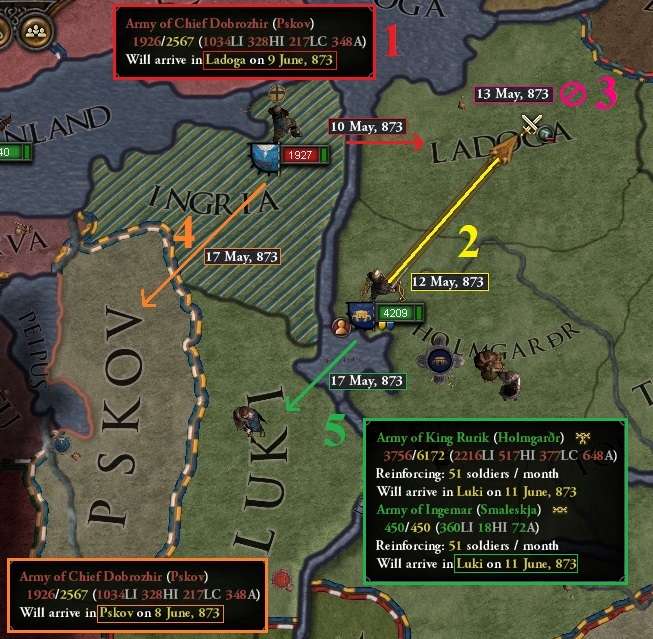
June 873
Sure enough, Dobrozhir arrives back in Pskov on 9 June and Rurik in Luki two days later – and immediately marches towards Pskov, where the forests will favour Rurik’s new-found expertise in rough terrain. Now there will be a reckoning!
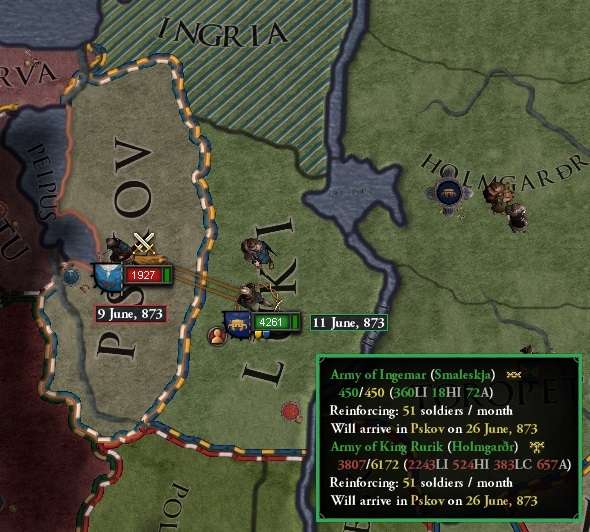
Battle of Pskov Tribe
The battle commences on 26 June. It opens in standard fashion, with the archers’ exchange, where Rurik now has a more than 2:1 advantage in numbers. By 28 June, Dobrozhir folds in the centre, once again leaving the fight to his holy warriors on the left. This time, Rurik has put Helgi on the right, to try to hold them (which he does, while taking some heaving casualties and lowered morale – not helped by Helgi’s lacklustre leadership abilities), as he and Sverker come to his aid. Which they both had by 6 July, when the Pskovan host breaks. All that is left now is the pursuit!
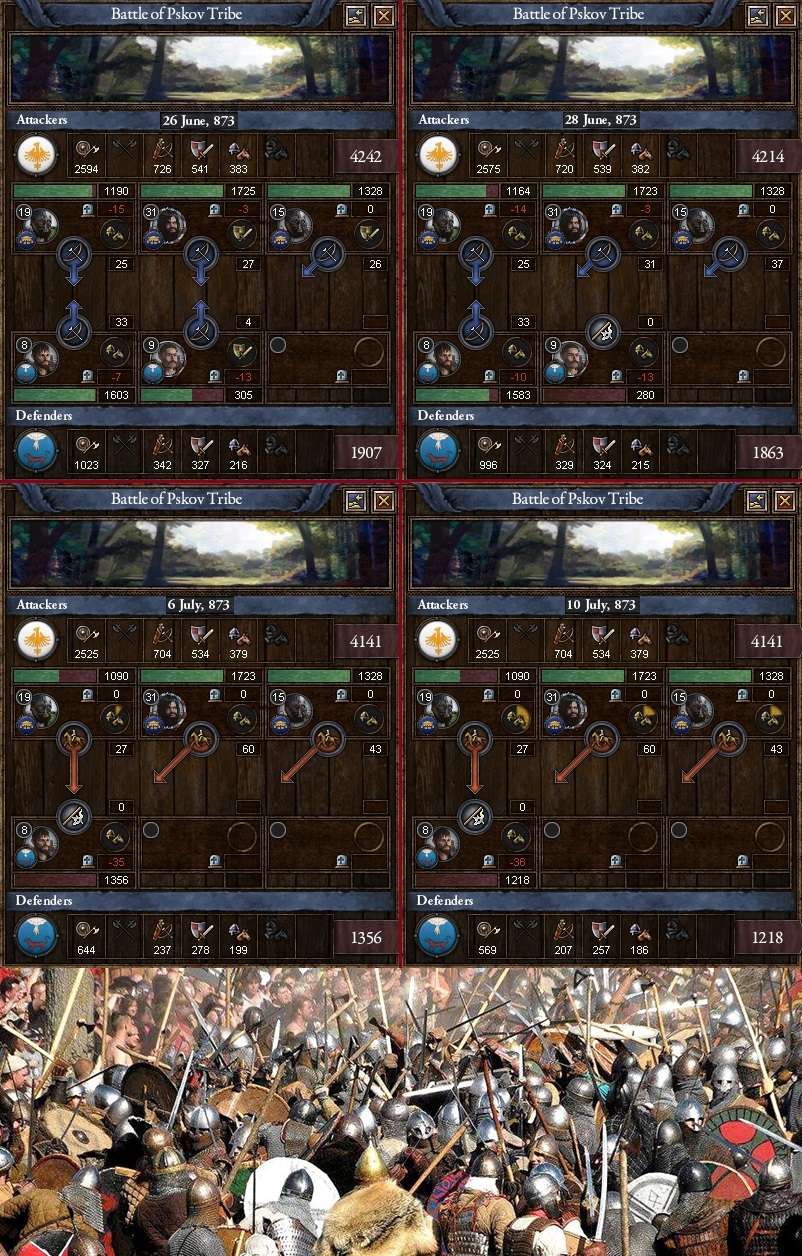
On 12 July the victory is declared, all the remaining Pskovan forces flee the field – heading towards Luki. They would, wouldn’t they! But Rurik let’s them run away as they will – he has other plans to finish this war quickly [even if the war score is still showing -19%].
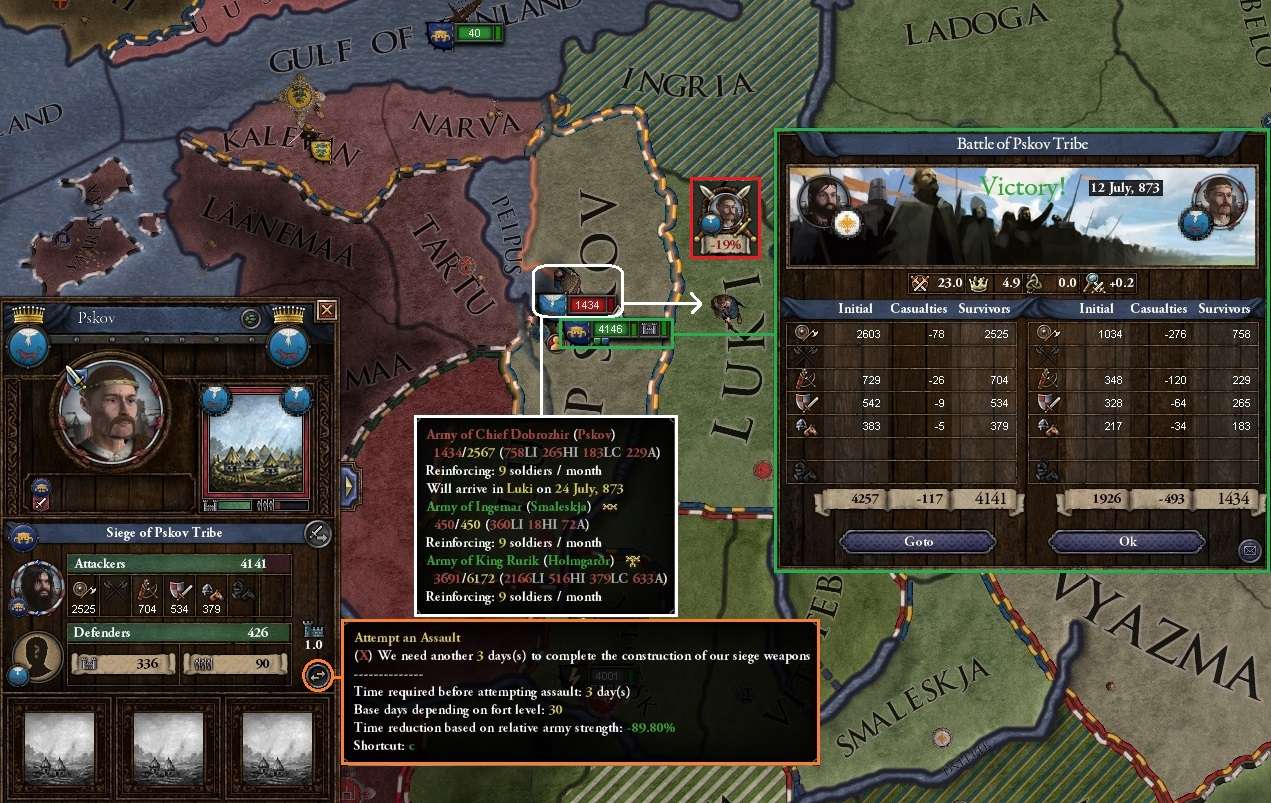
Rurik is impatient to end the war – it has taken much longer than he had planned and hoped for.
The assault goes ahead on 15 July and, after two days of fighting and only a hundred or so Holmgarðian casualties, it is done. Victory!
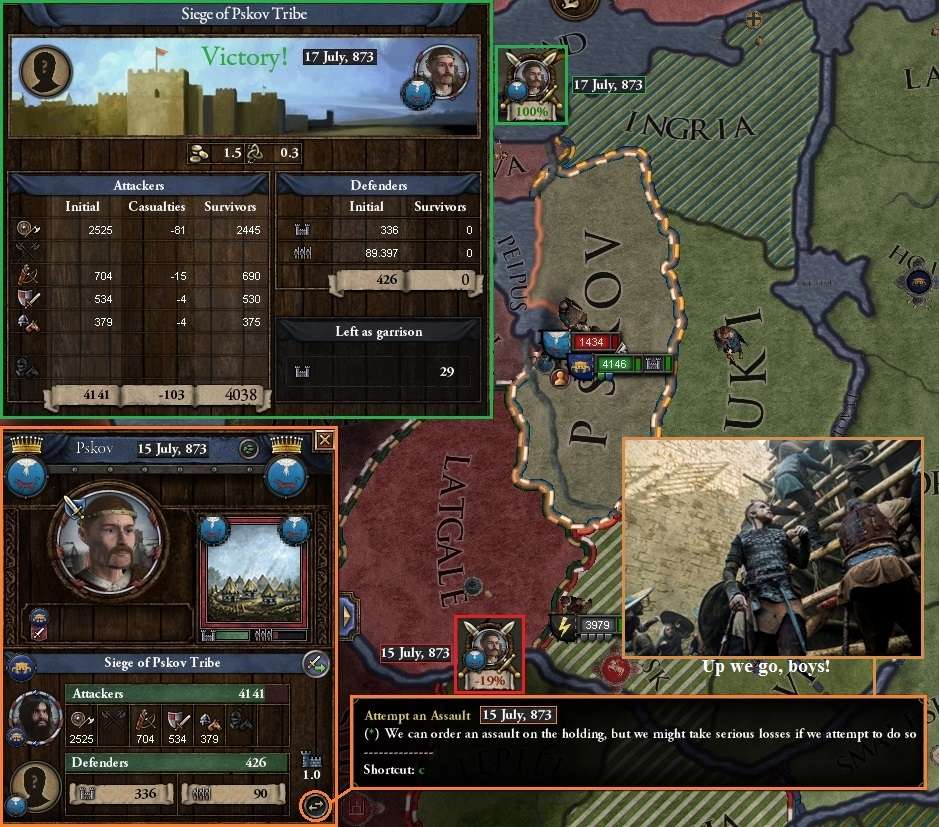
The fruits of victory are many. Prestige, piety and increased moral authority for the Norse faith at the defeat of the Slavic heathens. Pskov is now part of the King’s personal demesne. Time to celebrate!
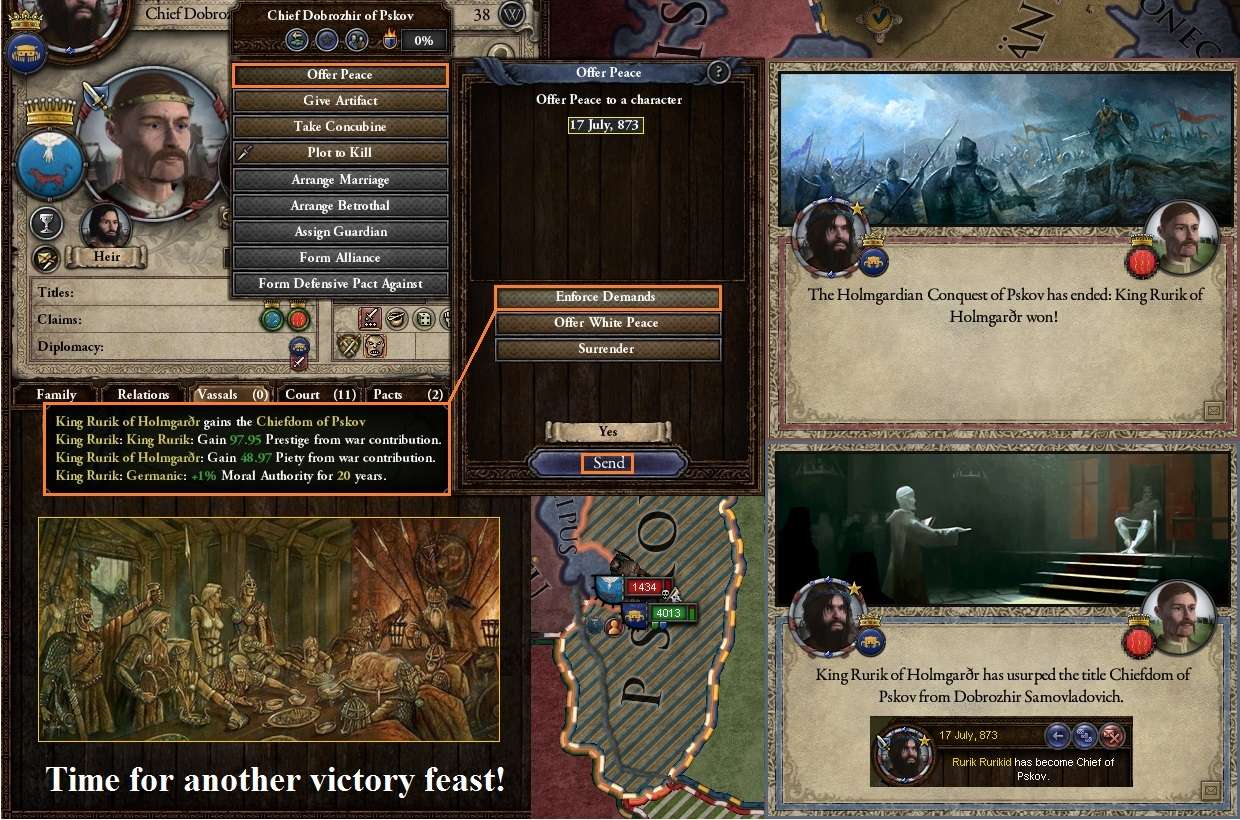
The following day, as hangovers are stoically ignored, the realm’s affairs must be organised. Their work done, the Bulgarian Company is dismissed, as are the levies. The loyal Egill’s troops head off back to Smaleskja and Nuyanza’s lands are restored to him in full. So ends the war of Conquest on Pskov.
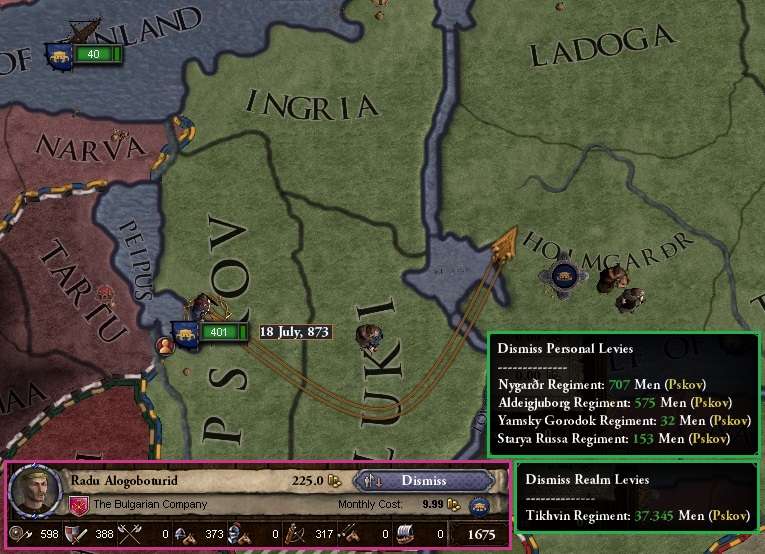
A Review of Realm Affairs
The Council provide advice that the previously discussed de jure Duchy of Pskov can now be claimed. However, the expenses of the recent war have drained a significant amount of gold from the treasury – Rurik doesn’t have the funds to carry it out, though he would like to: the added prestige would be handy and it would constitute the second Duchy he needs as part of his legal claim to create the Kingdom of Rus. But that can wait for now. His real question relates to the disposal of the title: if he does so, can he then (as he assumes) decide to whom it is assigned (himself or someone else)? Or could Svetozar somehow claim it, as existing Chief of Luki?
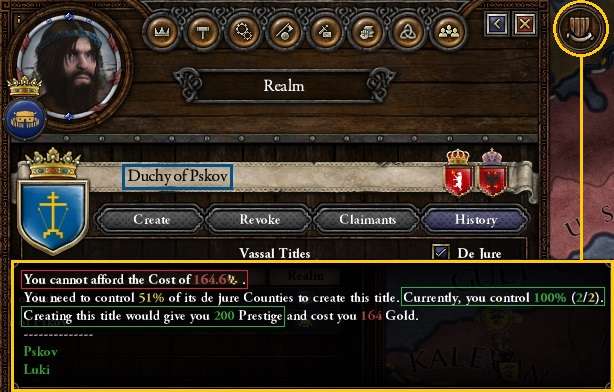
The prestige arising from the conquest of Pskov has of course taken Rurik to the point [ie above 1000 prestige] where he is acclaimed as Exalted among Men [this provides a bonus of another 100 prestige – nice]. He should now pick a new ambition: there is a choice between two now. It seems a slam dunk, given his territorial ambitions. His stewardship is strong already – gaining one more point is neither here nor there. He has not selected it yet – he would see if any of the wise people of the Thing would advise against it – but he does yearn to create the Kingdom of Rus. Perhaps in his own lifetime.
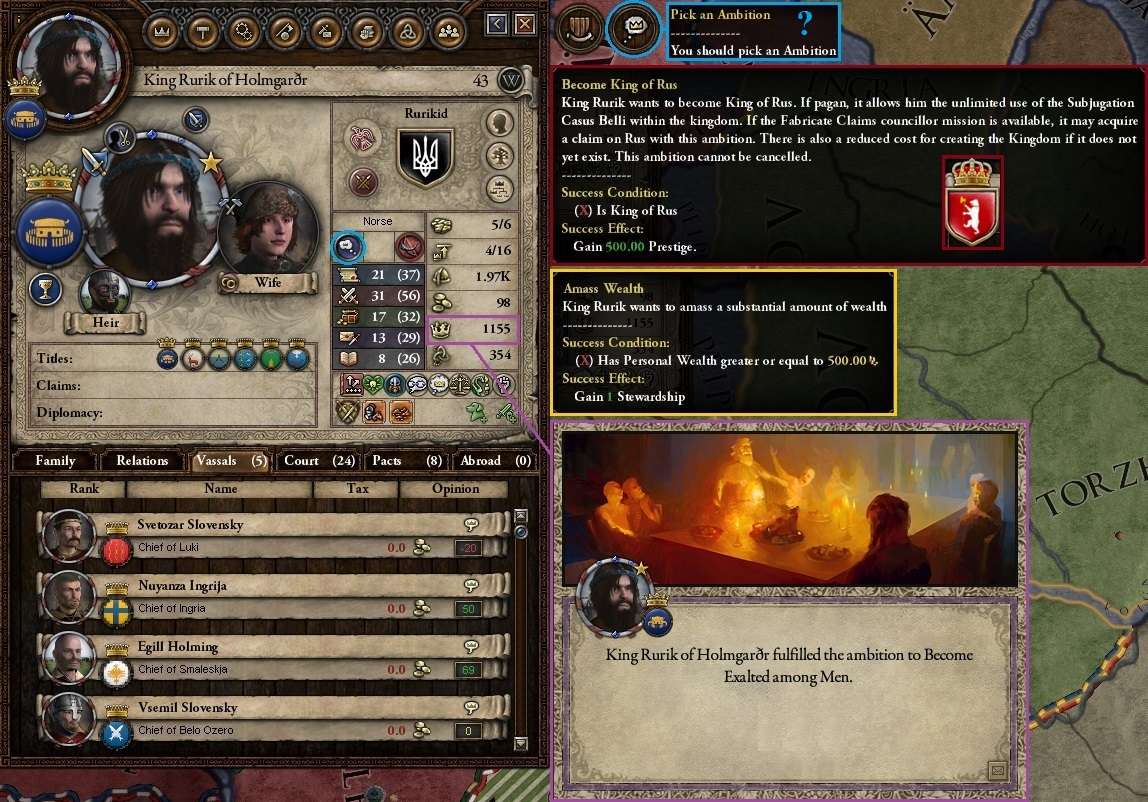
Rurik also looks at some other aspects of his demesne. Clearly, once funds are available, Pskov may be built further. But he must decide whether he intends to keep it in his personal demesne in the longer term before he invests too must gold or prestige in its development. He also considers his children and their current and future places in the realm.
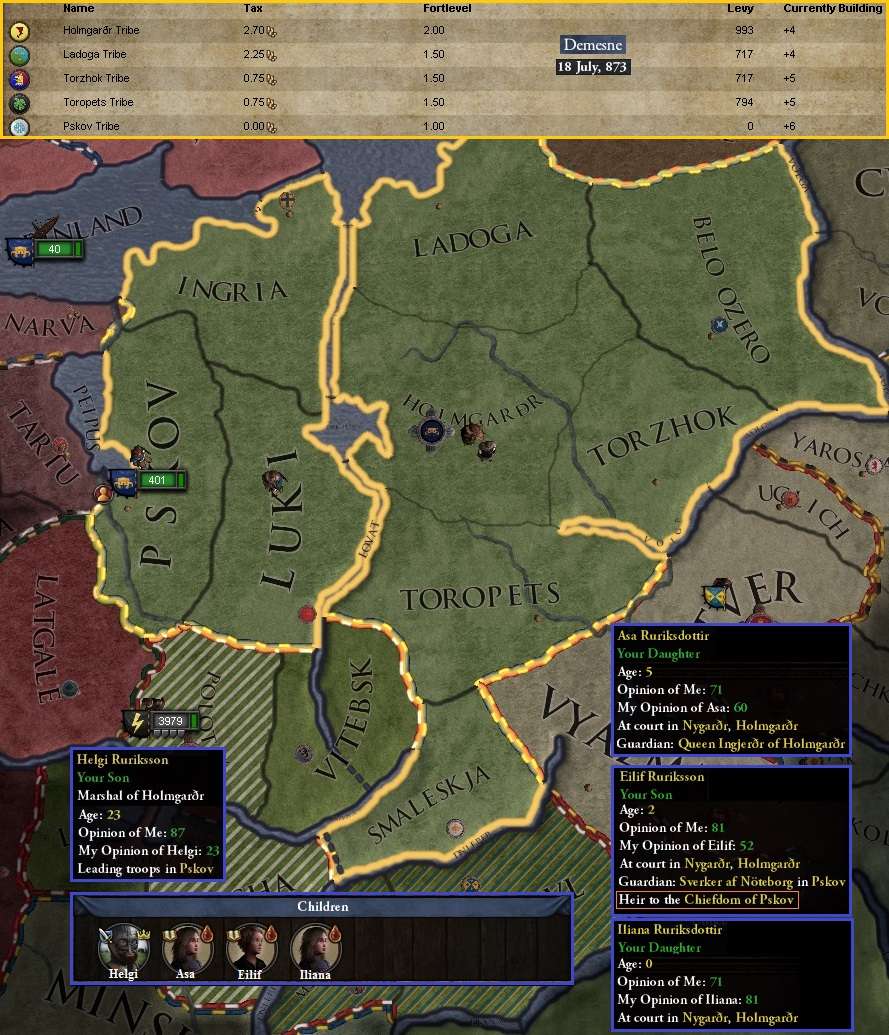
First is Helgi. Designated heir under the agnatic gavelkind system that applies. Marshal of the Realm. But with his problems. He will think more deeply on Helgi shortly. Asa is now five years old and remains under the guardianship of her mother. Eilif is now two – and he sees, under the gavelkind rules of the kingdom, that he is now the assigned heir to the newly acquired Chiefdom of Pskov. Sverker will continue to raise him, hopefully to become a true Norse warrior. And Iliana, the youngest, just a babe: not yet even assigned a guardian. Perhaps she should be raised by someone well versed in the ways of spiritualism and learning? A gift for the Faith. And at some point, betrothals may become useful.
And now we focus on Helgi again ... as Rurik does. [These characteristics were examined at the start of the game, but it’s now time for Rurik to focus on him again.] While he is quick and a master tactician, giving him good martial ability, his craven nature is a big drag on the morale of any troops he commands. Other than for potential vassal opinion (if he comes to rule), the rest of his sinful or negative characteristics are distasteful but not fatal for a ruler – especially a tribal one. The worst problem for Rurik is one that has been discussed before – the fact that while Helgi is Norse, he worships the heathen Slavic gods. So, if he inherits, this would most likely send the kingdom that way too. Which runs counter to Rurik’s zealous belief in the Norse faith. But, given the bulk of the current provinces under rule now and that would make up the future Kingdom of Rus seem to be Slavic too – should this possibility of conversion be allowed for the good of the future, or resisted.
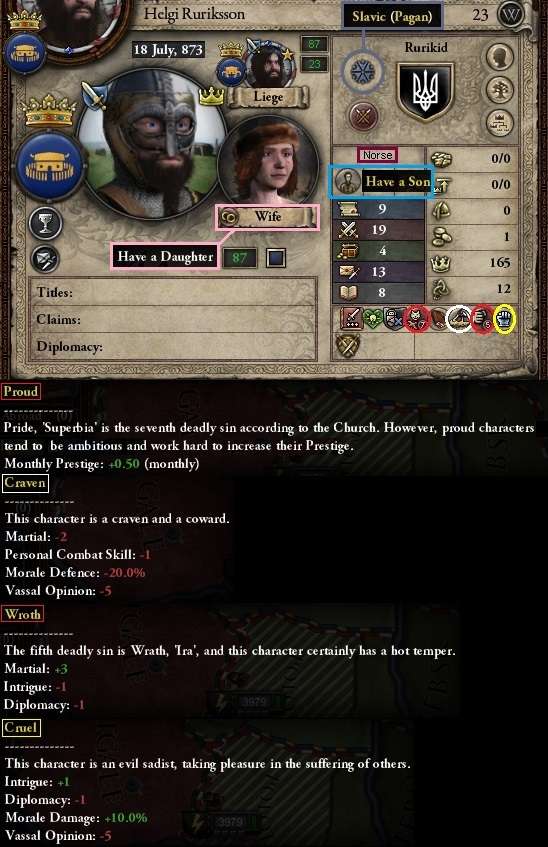
The hard question Rurik must ask himself is should Helgi’s faith be disapproved of but tolerated? Would the dream of Rus be easier to achieve under a Slavic future, after Rurik passes? Or should it be rejected and measures taken to see Helgi does not inherit? Rurik will not countenance murdering him and cannot compel him to convert under unreformed paganism. But he could try to see if repeated command in battle might produce a fatal injury. And are there any plots or legal manouevres Rurik could instigate to start swinging the succession votes away from Helgi and – perhaps – to Eilif instead? What would the likely repercussions of that be?
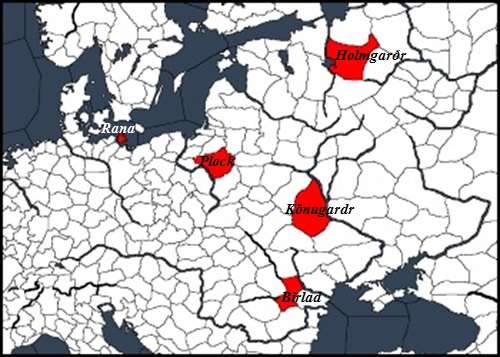
Holy sites: Holmgarðr (Tihkvin), Könugardr (Yuriev), Plock (Pruszkow), Birlad (Husi), and Rana (Arkona). Would these be any harder to unite under Rurikid rule than the Norse sites?
Another lesser issue is that – Helgi is without issue! There are no reasons Rurik can see that in six and a half years Helgi and his wife Jorunn should not have had children. Rurik has asked Helgi and he has stated that his main ambition at the moment is indeed to have a son. While Jorunn would like a prefer a daughter, the actions taken to have one are the same, so that should not be an impediment either – indeed it should be an encouragement!
Rurik is not sure what to do on this question of religion that is both highly personal but also of strategic important for the future of the kingdom. He seeks wise advice from any who would offer it.
Another issue in Rurik's mind is that of some vacant minor titles that need specialists to fill them. Rurik seeks the guidance of his council and the Thing as to how he might best go about recruiting or attracting a Völva and a Skald to the court.
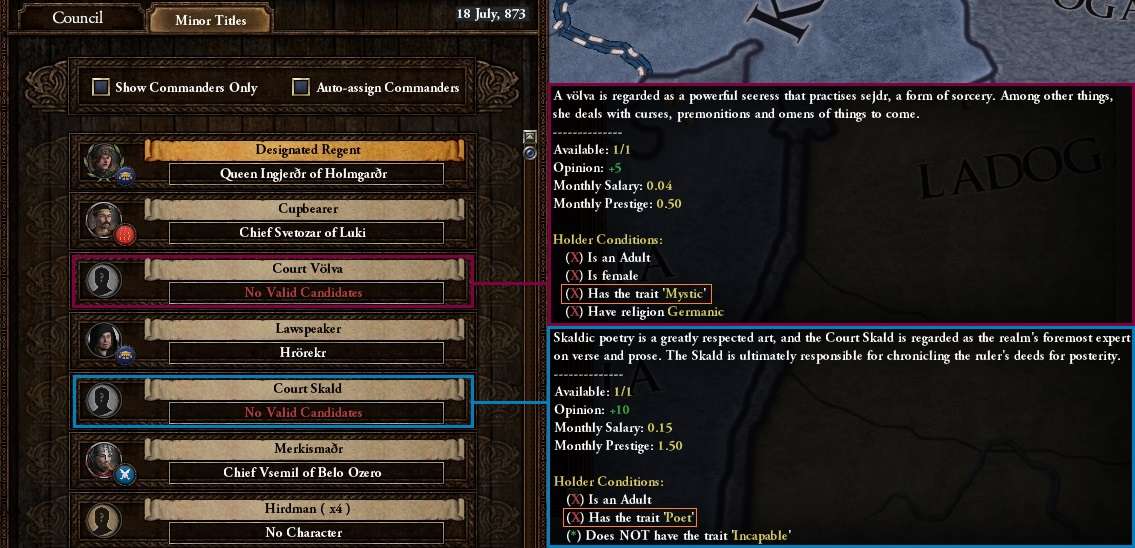
Questions
The next Thing has been asked to consider some more questions. The first pertains directly to the war; the remainder to what comes next. Answers for both this and the previous chapter’s questions and comments will be dealt with at this Thing of July 873, the Sixth of Rurik’s Reign. And as always, more general or narrative comments and feedback are always welcome, especially if you think others have fully answered the gameplay questions.
[A note to my dear readers: I have an international work trip that will take me out of the country from Wednesday to Saturday (my time), then another trip (a trip down to a beach house for our summer holidays) as soon as I get back, for another week after that. So the next Thing is unlikely to be formally written up until somewhat later than that, and certainly the next turn won’t be played before then.]
Ch 15 Q2: Creating a New Duchy. Do I have this right? If Rurik creates it, there are no funnies about who it goes to – he can allocate it as he desires?
Ch 15 Q3: Housekeeping. I will need to set a guardian for the youngest child. At this stage, I don’t have the DLC that allows you to set a focus for the children, just choose a guardian. I’m thinking to pick as guardian the Norse courtier with the highest learning numbers/characteristics, but am open for other suggestions. With Eilif, under gavelkind is he likely to be made heir to anything else, or is it the smallest/weakest demesne county? Should I not bother developing it for now and just focus on the main four? And now that there is plenty of prestige to go around, should it be devoted to military buildings in the primary demesne counties? Any views on the best kind of buildings to start with in this situation?
Ch 15 Q4: How do you solve a problem like Helgi? Per the question posed by Rurik, what options and advice do the wise readership have (acknowledging there has been discussion about this before, but time has moved on and things are coming to a head. Rurik wants to sort out the way ahead before his time comes (as it could in combat at any time, but otherwise he probably has between 10 to maybe 15 years at the very most to see the succession stitched up as best he can. If Rus is the first major objective, should that take priority. And would a Slavic future be better for that? Or would Norse (reformed later if possible) be preferable? Any and all views sought.
Ch 15 Q5: Völva and Skald. Is the Völva the equivalent of the Court Physician in a Norse realm? I’ve not seen anything else that might look like that appointment. Does it work in a similar way, or does it bring entirely different benefits. And, also with the Skald, it this something I should be actively trying to source (ie looking for marriage partners for courtiers with the Mystic and Poet characteristics as a recruitment method, or some such)? Again, facts, views and hints most welcome.
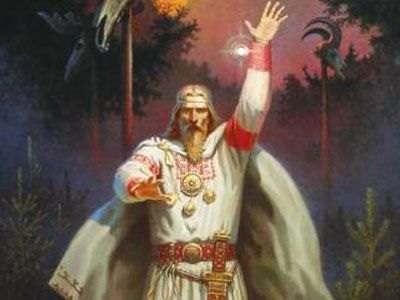 Perun (Cyrillic: Перун) is the highest god of the Slavic pantheon and the god of thunder and lightning. His other attributes are fire, mountains, wind, the oak, iris, eagle, firmament, horses and carts, weapons (hammer, axe (Axe of Perun), and arrow), and war. Is there a chance that Helgi, as King, may take the realm and the hoped-for Kingdom of Rus down the path of worshipping this heathen God? Or even eventually to convert to one of the other organised religions, such as Catholicism or Orthodox Christianity, Islam or some other?
Perun (Cyrillic: Перун) is the highest god of the Slavic pantheon and the god of thunder and lightning. His other attributes are fire, mountains, wind, the oak, iris, eagle, firmament, horses and carts, weapons (hammer, axe (Axe of Perun), and arrow), and war. Is there a chance that Helgi, as King, may take the realm and the hoped-for Kingdom of Rus down the path of worshipping this heathen God? Or even eventually to convert to one of the other organised religions, such as Catholicism or Orthodox Christianity, Islam or some other?
Foreword – AuthAAR’s Note
As promised, here is the second instalment of the war of conquest on Pskov. So far, things have gone badly wrong. Again, I note here that this period was played through before the last set of advice was received, so I’m not ignoring any of the points the readership have made since Chapter 14
As mentioned before, I will do a collated summary of all points/Q&As from both chapters after this one, as there may be some more overall comments made. We pick up the story with Pskov once again victorious in Ingria following a rash and over-confident attack on Ingria from Holmgarðr over the Volkhov river. The war score now stands at -34% in Pskov’s favour. And Rurik must consider Plan D!
ᚔ ᚱᚢᚱᛁ ᚲᛁᛞ ᚔ
January 873
The first news of the new year of 873 CE is bad. The Pskovan siege of Ingria’s small garrison of 112 is over; the siege of Ingria Tribe begins. The mercenary-based Holmgarðian army (the Bulgarian Company) is still retreating south from Ingria.

Rurik is now back in Holmgarðr, with Helgi – who is generally very angry about the defeat, taking it out on the common soldiers. As he seems to do when he feels his pride has been besmirched – and his shaky courage challenged, which he tends to try to cover with bravado. These traits undermine what should otherwise be the very strong martial abilities of a smart young man.
“Young Helgi, I like losing no better than you, but I blame myself for this and no other. Not you; not the soldiers. The mercenaries fought valiantly, though I took them into battle too soon in retrospect. I should have insisted we got to know each other’s ways, and them our methods of command, before I rushed in. And I should never have done so trying to cross the Volkhov – it put us at a grave disadvantage.”
“Yes father, but I can’t help my blood boiling with rage thinking on it.” Helgi eyes Rurik’s faithful dog Hunter as he sits at his feet. He whimpers slightly, detecting the moods of his human companions. Helgi barely restrains himself from lashing out with his booted foot to kick the mangy cur!
“But as we say back in Nygarðr: ‘Don’t get bitter, get better!’ And by Thor’s mighty hammer, we shall do just that!” He ignores the fishy look Helgi gives at the mention of the Norse God: while Helgi is culturally Norse himself, his upbringing as a bastard before being acknowledged by Rurik and joining him at court sees him worshipping heathen Slavic Gods.
“Helgi, summon the Chiefs to war as allies – I will have every man available for our task that we might. And we will see which of them are loyal and which are not. Though I think we have a pretty fair idea already. I would have proof. And I will be wroth myself at any who fail to respond!”
“Yes father, but I can’t help my blood boiling with rage thinking on it.” Helgi eyes Rurik’s faithful dog Hunter as he sits at his feet. He whimpers slightly, detecting the moods of his human companions. Helgi barely restrains himself from lashing out with his booted foot to kick the mangy cur!
“But as we say back in Nygarðr: ‘Don’t get bitter, get better!’ And by Thor’s mighty hammer, we shall do just that!” He ignores the fishy look Helgi gives at the mention of the Norse God: while Helgi is culturally Norse himself, his upbringing as a bastard before being acknowledged by Rurik and joining him at court sees him worshipping heathen Slavic Gods.
“Helgi, summon the Chiefs to war as allies – I will have every man available for our task that we might. And we will see which of them are loyal and which are not. Though I think we have a pretty fair idea already. I would have proof. And I will be wroth myself at any who fail to respond!”
The scribes are immediately sent to write the letters of summons, which will soon be on their way.
“I know it’s not many, but we have a few more levies available from our demesne who have been trained since the call last went out, father. Shall we call them too?”
“Yes, do it, but just for Holmgarðr itself. Let the others build for the future.”
“Yes, do it, but just for Holmgarðr itself. Let the others build for the future.”

The responses start coming in a few weeks later. Neither of the Slovenskys answer the call – Rurik had thought a little better of Vsemil. But no, he would not support the fight against his kinsman, even though Pskovan troops (and holy warriors of their own Slavic persuasion too – the filthy heretics) are encamped on Holmgarðian soil. Well, let their ‘acorns’ be roasted over a slow fire – while still attached! Loyal Egill was never doubted and Nuyanza (both through improved opinion of his King and as the one whose lands are under siege) is willing – though it’s uncertain what the latter can actually do to aid the cause in his situation.

Ch 15 Q1: Calling Allies when they are occupied. I was trying to avoid it, but the call for allies went out to Nuyanza as well, with Ingria currently occupied by the Pskovans. If he does respond, are his forces raised but slaughtered? Or raised inside his holding? Or are they just not raised? Just curious on what happens in-game. I take it they can be called one by one to avoid that? Any other key points or tips about calling vassal allies as a tribal leader welcome.
The month ends with Holmgarðr’s forces in movement around the realm. The main (original) army of the realm is in Toropets, having rallied in Smaleskja, and is on its way back to the capital. Egill’s Smaleskjan contingent of 450 men is now also on its way to the capital. The recently defeated Bulgarian Company is in Luki in retreat to its rally point in Smaleskja. The Pskovans continue the siege in Ingria.

February 873
Chief Nuyanza provides a report on the progress of the siege of his last holding in Ingria. He would like to plead for its relief, but knows the King has tried this twice now, to no avail, and the full strength of the realm will take time to assemble. The job of defending his keep is left to one of his vassals. But this time it will take longer, which at least buys time for Rurik to gather his forces.

By 23 February, the kingdom’s main army is back in the capital and has merged with the few reinforcements already there. At least now Holmgarðr county itself can be credibly defended from a Pskovan raid. Sverker and Helgi are given the wing commands again – despite Rurik’s unspoken misgivings about his son.

April 873
Mid-April sees the fall of the Ingria Tribe holding and the occupation of that county by Dobrozhir’s Pskovans. He sets his sights next on Luki: where his recalcitrant relative Svetozar refuses to call out his men to aid the realm. Perhaps he wants Dobrozhir to come – even if his brother himself has claim on Luki. The treasonous scum! Meanwhile, the loyal Egill’s forces have joined the King in Holmgaðr and the Bulgarian Company are not far away after their long retreat south and now march back north, through the spring thaw – and mud.

May 873
In the beginning of May, Rurik has his full strength mustered, including a decent mix of light and heavy infantry, archers and light cavalry. He decides to try to deter Dobrozhir from entering Luki (where they will be difficult to get at without exposing the capital to danger), even though it involves another possible river-crossing attack. Rurik can always pull out if the Pskovans persist, making it a feint.

The tactic works. At the end of the week, Dobrozhir changes course and heads straight to Holmgarðr! Rurik halts too – it suits him fine if Dobrozhir wants to attack him across a river this time! He now fully appreciates, as he plans his defence, the disadvantage he placed himself under in his last attack on Ingria, as the Pskovans head his way over the same river.

But the game of cat-and-mouse gets more and more complicated. First, on 10 May Dobrozhir sees Rurik is ready for him in Holmgarðr and strikes east instead to Ladoga. The ignominy (and danger to facilities) of having his second most important personal holding occupied for too long are prohibitive for Rurik. On 12 May he moves to block this attack: if Dobrozhir persists, Rurik will hit him a couple of days after the Pskovans arrive. Again, Dobrozhir is baulked and on 13 May he breaks off the river crossing and pulls back to Ingria, while Rurik again waits in the centrally located capital to see what his enemy does next.
Four days later, Dobrozhir seemingly loses either his patience or his nerve and heads back to Pskov. This is just the kind of thing Rurik was waiting for: he marches the same day for Luki to shadow the enemy force, and will arrive there three days after the Pskovans are due back to their homeland. And wherever they go after that, Rurik will be able to attack them without a river in the way. But best if it is in their own holding - meaning a chance to end the war quickly.
“Now I have the swine!” exclaims Rurik gleefully. “The soil will run red with their life’s blood!”

June 873
Sure enough, Dobrozhir arrives back in Pskov on 9 June and Rurik in Luki two days later – and immediately marches towards Pskov, where the forests will favour Rurik’s new-found expertise in rough terrain. Now there will be a reckoning!

Battle of Pskov Tribe
The battle commences on 26 June. It opens in standard fashion, with the archers’ exchange, where Rurik now has a more than 2:1 advantage in numbers. By 28 June, Dobrozhir folds in the centre, once again leaving the fight to his holy warriors on the left. This time, Rurik has put Helgi on the right, to try to hold them (which he does, while taking some heaving casualties and lowered morale – not helped by Helgi’s lacklustre leadership abilities), as he and Sverker come to his aid. Which they both had by 6 July, when the Pskovan host breaks. All that is left now is the pursuit!

On 12 July the victory is declared, all the remaining Pskovan forces flee the field – heading towards Luki. They would, wouldn’t they! But Rurik let’s them run away as they will – he has other plans to finish this war quickly [even if the war score is still showing -19%].

Rurik is impatient to end the war – it has taken much longer than he had planned and hoped for.
“Let us be done with this quickly. Sverker, how long will it take us to prepare our equipment to storm their walls – we have the numbers and I would have this finished before their army retreats across our lands and turns to raiding them. I would also have Nuyanza’s pain remedied as soon as may be possible. I’ll not sit in siege for long months, as we were beholden to in Britannia.”
“We have many hands ready to prepare. We can be ready in just three days, my Konungr!”
“Then let us be quick to their walls and hearths. I would see Dobrozhir grovel before me, his heathen warrior host disbanded and the Rurikid banner hoisted above the keep of Pskov.”
“We have many hands ready to prepare. We can be ready in just three days, my Konungr!”
“Then let us be quick to their walls and hearths. I would see Dobrozhir grovel before me, his heathen warrior host disbanded and the Rurikid banner hoisted above the keep of Pskov.”
The assault goes ahead on 15 July and, after two days of fighting and only a hundred or so Holmgarðian casualties, it is done. Victory!

The fruits of victory are many. Prestige, piety and increased moral authority for the Norse faith at the defeat of the Slavic heathens. Pskov is now part of the King’s personal demesne. Time to celebrate!

The following day, as hangovers are stoically ignored, the realm’s affairs must be organised. Their work done, the Bulgarian Company is dismissed, as are the levies. The loyal Egill’s troops head off back to Smaleskja and Nuyanza’s lands are restored to him in full. So ends the war of Conquest on Pskov.

ᚔ ᚱᚢᚱᛁ ᚲᛁᛞ ᚔ
A Review of Realm Affairs
The Council provide advice that the previously discussed de jure Duchy of Pskov can now be claimed. However, the expenses of the recent war have drained a significant amount of gold from the treasury – Rurik doesn’t have the funds to carry it out, though he would like to: the added prestige would be handy and it would constitute the second Duchy he needs as part of his legal claim to create the Kingdom of Rus. But that can wait for now. His real question relates to the disposal of the title: if he does so, can he then (as he assumes) decide to whom it is assigned (himself or someone else)? Or could Svetozar somehow claim it, as existing Chief of Luki?

Ch 15 Q2: Creating a New Duchy. Do I have this right? If Rurik creates it, there are no funnies about who it goes to – he can allocate it as he desires?
The prestige arising from the conquest of Pskov has of course taken Rurik to the point [ie above 1000 prestige] where he is acclaimed as Exalted among Men [this provides a bonus of another 100 prestige – nice]. He should now pick a new ambition: there is a choice between two now. It seems a slam dunk, given his territorial ambitions. His stewardship is strong already – gaining one more point is neither here nor there. He has not selected it yet – he would see if any of the wise people of the Thing would advise against it – but he does yearn to create the Kingdom of Rus. Perhaps in his own lifetime.

Rurik also looks at some other aspects of his demesne. Clearly, once funds are available, Pskov may be built further. But he must decide whether he intends to keep it in his personal demesne in the longer term before he invests too must gold or prestige in its development. He also considers his children and their current and future places in the realm.

First is Helgi. Designated heir under the agnatic gavelkind system that applies. Marshal of the Realm. But with his problems. He will think more deeply on Helgi shortly. Asa is now five years old and remains under the guardianship of her mother. Eilif is now two – and he sees, under the gavelkind rules of the kingdom, that he is now the assigned heir to the newly acquired Chiefdom of Pskov. Sverker will continue to raise him, hopefully to become a true Norse warrior. And Iliana, the youngest, just a babe: not yet even assigned a guardian. Perhaps she should be raised by someone well versed in the ways of spiritualism and learning? A gift for the Faith. And at some point, betrothals may become useful.
Ch 15 Q3: Housekeeping. I will need to set a guardian for the youngest child. At this stage, I don’t have the DLC that allows you to set a focus for the children, just choose a guardian. I’m thinking to pick as guardian the Norse courtier with the highest learning numbers/characteristics, but am open for other suggestions. With Eilif, under gavelkind is he likely to be made heir to anything else, or is it the smallest/weakest demesne county? Should I not bother developing it for now and just focus on the main four? And now that there is plenty of prestige to go around, should it be devoted to military buildings in the primary demesne counties? Any views on the best kind of buildings to start with in this situation?
And now we focus on Helgi again ... as Rurik does. [These characteristics were examined at the start of the game, but it’s now time for Rurik to focus on him again.] While he is quick and a master tactician, giving him good martial ability, his craven nature is a big drag on the morale of any troops he commands. Other than for potential vassal opinion (if he comes to rule), the rest of his sinful or negative characteristics are distasteful but not fatal for a ruler – especially a tribal one. The worst problem for Rurik is one that has been discussed before – the fact that while Helgi is Norse, he worships the heathen Slavic gods. So, if he inherits, this would most likely send the kingdom that way too. Which runs counter to Rurik’s zealous belief in the Norse faith. But, given the bulk of the current provinces under rule now and that would make up the future Kingdom of Rus seem to be Slavic too – should this possibility of conversion be allowed for the good of the future, or resisted.

The hard question Rurik must ask himself is should Helgi’s faith be disapproved of but tolerated? Would the dream of Rus be easier to achieve under a Slavic future, after Rurik passes? Or should it be rejected and measures taken to see Helgi does not inherit? Rurik will not countenance murdering him and cannot compel him to convert under unreformed paganism. But he could try to see if repeated command in battle might produce a fatal injury. And are there any plots or legal manouevres Rurik could instigate to start swinging the succession votes away from Helgi and – perhaps – to Eilif instead? What would the likely repercussions of that be?

Holy sites: Holmgarðr (Tihkvin), Könugardr (Yuriev), Plock (Pruszkow), Birlad (Husi), and Rana (Arkona). Would these be any harder to unite under Rurikid rule than the Norse sites?
Another lesser issue is that – Helgi is without issue! There are no reasons Rurik can see that in six and a half years Helgi and his wife Jorunn should not have had children. Rurik has asked Helgi and he has stated that his main ambition at the moment is indeed to have a son. While Jorunn would like a prefer a daughter, the actions taken to have one are the same, so that should not be an impediment either – indeed it should be an encouragement!
Rurik is not sure what to do on this question of religion that is both highly personal but also of strategic important for the future of the kingdom. He seeks wise advice from any who would offer it.
Ch 15 Q4: How do you solve a problem like Helgi? Per the question posed by Rurik, what options and advice do the wise readership have (acknowledging there has been discussion about this before, but time has moved on and things are coming to a head. Rurik wants to sort out the way ahead before his time comes (as it could in combat at any time, but otherwise he probably has between 10 to maybe 15 years at the very most to see the succession stitched up as best he can. If Rus is the first major objective, should that take priority. And would a Slavic future be better for that? Or would Norse (reformed later if possible) be preferable? Any and all views sought.
Another issue in Rurik's mind is that of some vacant minor titles that need specialists to fill them. Rurik seeks the guidance of his council and the Thing as to how he might best go about recruiting or attracting a Völva and a Skald to the court.

Ch 15 Q5: Völva and Skald. Is the Völva the equivalent of the Court Physician in a Norse realm? I’ve not seen anything else that might look like that appointment. Does it work in a similar way, or does it bring entirely different benefits? And, also with the Skald, it this something I should be actively trying to source (ie looking for marriage partners for courtiers with the Mystic and Poet characteristics as a recruitment method, or some such)? Again, facts, views and hints most welcome.
ᚔ ᚱᚢᚱᛁ ᚲᛁᛞ ᚔ
Questions
The next Thing has been asked to consider some more questions. The first pertains directly to the war; the remainder to what comes next. Answers for both this and the previous chapter’s questions and comments will be dealt with at this Thing of July 873, the Sixth of Rurik’s Reign. And as always, more general or narrative comments and feedback are always welcome, especially if you think others have fully answered the gameplay questions.
[A note to my dear readers: I have an international work trip that will take me out of the country from Wednesday to Saturday (my time), then another trip (a trip down to a beach house for our summer holidays) as soon as I get back, for another week after that. So the next Thing is unlikely to be formally written up until somewhat later than that, and certainly the next turn won’t be played before then.]
ᚔ ᚱᚢᚱᛁ ᚲᛁᛞ ᚔ
Ch 15 Q1: Calling Allies when they are occupied. I was trying to avoid it, but the call for allies went out to Nuyanza as well, with Ingria currently occupied by the Pskovans. If he does respond, are his forces raised but slaughtered? Or raised inside his holding? Or are they just not raised? Just curious on what happens in-game. I take it they can be called one by one to avoid that? Any other key points or tips about calling vassal allies as a tribal leader welcome.
Ch 15 Q2: Creating a New Duchy. Do I have this right? If Rurik creates it, there are no funnies about who it goes to – he can allocate it as he desires?
Ch 15 Q3: Housekeeping. I will need to set a guardian for the youngest child. At this stage, I don’t have the DLC that allows you to set a focus for the children, just choose a guardian. I’m thinking to pick as guardian the Norse courtier with the highest learning numbers/characteristics, but am open for other suggestions. With Eilif, under gavelkind is he likely to be made heir to anything else, or is it the smallest/weakest demesne county? Should I not bother developing it for now and just focus on the main four? And now that there is plenty of prestige to go around, should it be devoted to military buildings in the primary demesne counties? Any views on the best kind of buildings to start with in this situation?
Ch 15 Q4: How do you solve a problem like Helgi? Per the question posed by Rurik, what options and advice do the wise readership have (acknowledging there has been discussion about this before, but time has moved on and things are coming to a head. Rurik wants to sort out the way ahead before his time comes (as it could in combat at any time, but otherwise he probably has between 10 to maybe 15 years at the very most to see the succession stitched up as best he can. If Rus is the first major objective, should that take priority. And would a Slavic future be better for that? Or would Norse (reformed later if possible) be preferable? Any and all views sought.
Ch 15 Q5: Völva and Skald. Is the Völva the equivalent of the Court Physician in a Norse realm? I’ve not seen anything else that might look like that appointment. Does it work in a similar way, or does it bring entirely different benefits. And, also with the Skald, it this something I should be actively trying to source (ie looking for marriage partners for courtiers with the Mystic and Poet characteristics as a recruitment method, or some such)? Again, facts, views and hints most welcome.
ᚔ ᚱᚢᚱᛁ ᚲᛁᛞ ᚔ

Last edited:
A very pressing set of questions indeed. It was well done to rectify the earlier reverses my king!
Re your questions:
1. Allies: pretty sure AI will try and avoid raising them in an occupied area unless there is some sort of parity in numbers. Don’t quote me on that though.
2. If you create a new Duchy you can give it to whom you will but they must already have a county level title
3. Choosing a guardian for your youngest. I generally wait until they are 6 when you get reminded anyway. With the new DLCs focus is important. It kinda depends what kind of guy you want him to be. I usually split between martial or diplomatic for eldest and then learning for next with a view to maybe a career in the church (or your equivalent). For the youngest I focus on intrigue. Clearly those are just my preferences.
4. With Helgi have you actually tried to get him to change religion? If not your idea about putting him in harms way is a good one and refocus on the next son who is of the faith. Or as and when you have a replacement you can imprison and execute him. Depends how bloodthirsty you want to be really.
Re your questions:
1. Allies: pretty sure AI will try and avoid raising them in an occupied area unless there is some sort of parity in numbers. Don’t quote me on that though.
2. If you create a new Duchy you can give it to whom you will but they must already have a county level title
3. Choosing a guardian for your youngest. I generally wait until they are 6 when you get reminded anyway. With the new DLCs focus is important. It kinda depends what kind of guy you want him to be. I usually split between martial or diplomatic for eldest and then learning for next with a view to maybe a career in the church (or your equivalent). For the youngest I focus on intrigue. Clearly those are just my preferences.
4. With Helgi have you actually tried to get him to change religion? If not your idea about putting him in harms way is a good one and refocus on the next son who is of the faith. Or as and when you have a replacement you can imprison and execute him. Depends how bloodthirsty you want to be really.
This reminds me of a war I fought when I had a Baltic start a couple of years ago.
But again I will refrain from answering for fear of leading you astray.
But again I will refrain from answering for fear of leading you astray.
4. Yes, did see if it would allow me to get him to change religion earlier: can’t do that until Nor is reformed - then I’m not sure whether he might just say no anyway.A very pressing set of questions indeed. It was well done to rectify the earlier reverses my king!
Re your questions:
1. Allies: pretty sure AI will try and avoid raising them in an occupied area unless there is some sort of parity in numbers. Don’t quote me on that though.
2. If you create a new Duchy you can give it to whom you will but they must already have a county level title
3. Choosing a guardian for your youngest. I generally wait until they are 6 when you get reminded anyway. With the new DLCs focus is important. It kinda depends what kind of guy you want him to be. I usually split between martial or diplomatic for eldest and then learning for next with a view to maybe a career in the church (or your equivalent). For the youngest I focus on intrigue. Clearly those are just my preferences.
4. With Helgi have you actually tried to get him to change religion? If not your idea about putting him in harms way is a good one and refocus on the next son who is of the faith. Or as and when you have a replacement you can imprison and execute him. Depends how bloodthirsty you want to be really.
This reminds me of a war I fought when I had a Baltic start a couple of years ago.
But again I will refrain from answering for fear of leading you astray.
Only a couple quick answers.
2. If you create the duchy, it is yours to do with as you please. Keep or award to a suitable vassal. HOWEVER. Do NOT give it away until you are a true King with a Kingdom level title. As a Duke, granting a Duchy to a vassal also grants them independence. A Duke cares not for the opinions of another Duke, only a King.
4. If Helgi is your oldest, Slavic son and you don't want that to inherit, make him a commander of some small levy and put him to sea until he dies of scurvy.
Edit: pick an educator with the correct skill set (ie if you want a God of War his educator needs a Martial education himself) and the highest level (Brilliant Strategist) as the education of heirs is determined in that way pre-Conclave. They get the educators education focus, and the better the educator, the more likely the child will be good at it as well.
2. If you create the duchy, it is yours to do with as you please. Keep or award to a suitable vassal. HOWEVER. Do NOT give it away until you are a true King with a Kingdom level title. As a Duke, granting a Duchy to a vassal also grants them independence. A Duke cares not for the opinions of another Duke, only a King.
4. If Helgi is your oldest, Slavic son and you don't want that to inherit, make him a commander of some small levy and put him to sea until he dies of scurvy.
Edit: pick an educator with the correct skill set (ie if you want a God of War his educator needs a Martial education himself) and the highest level (Brilliant Strategist) as the education of heirs is determined in that way pre-Conclave. They get the educators education focus, and the better the educator, the more likely the child will be good at it as well.
Threadmarks
View all 262 threadmarks
Reader mode
Reader mode

